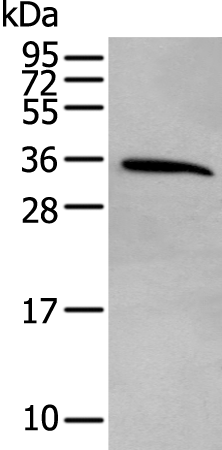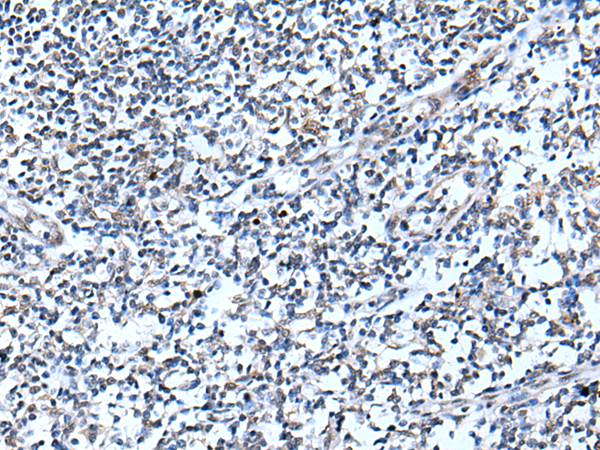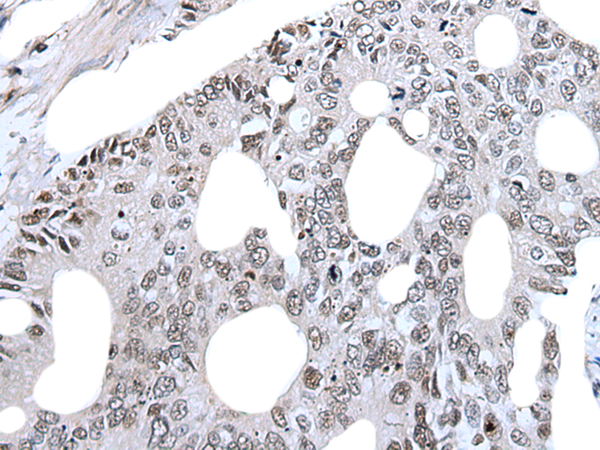


| WB | 咨询技术 | Human,Mouse,Rat |
| IF | 咨询技术 | Human,Mouse,Rat |
| IHC | 1/10-1/50 | Human,Mouse,Rat |
| ICC | 技术咨询 | Human,Mouse,Rat |
| FCM | 咨询技术 | Human,Mouse,Rat |
| Elisa | 1/5000-1/10000 | Human,Mouse,Rat |
| Aliases | UBC3; UBCH3; UBE2R1; E2-CDC34 |
| WB Predicted band size | 27 kDa |
| Host/Isotype | Rabbit IgG |
| Antibody Type | Primary antibody |
| Storage | Store at 4°C short term. Aliquot and store at -20°C long term. Avoid freeze/thaw cycles. |
| Species Reactivity | Human, Mouse |
| Immunogen | Synthetic peptide of human CDC34 |
| Formulation | Purified antibody in PBS with 0.05% sodium azide and 50% glycerol. |
+ +
以下是3篇关于CDC34抗体的代表性文献概览,包含文献名称、作者及摘要核心内容:
---
1. **文献名称**: *"Identification of the substrate recognition domains of the ubiquitin-conjugating enzyme CDC34"*
**作者**: Koegl M. et al. (1999)
**摘要**: 本研究通过免疫沉淀和Western blot实验,利用特异性CDC34抗体验证了CDC34作为E2泛素连接酶的功能结构域。研究发现CDC34通过C端酸性延伸结构域识别底物(如β-catenin),并揭示了其在SCF复合物介导的蛋白酶体降解中的关键作用。
---
2. **文献名称**: *"Phosphorylation-dependent regulation of CDC34 ubiquitin-conjugating enzyme activity"*
**作者**: Skowyra D. et al. (1999)
**摘要**: 利用抗CDC34抗体探究其磷酸化修饰对酶活性的影响。研究表明CDC34在细胞周期G1/S期转换中被CDK磷酸化,从而增强与SCF E3连接酶的结合能力,促进细胞周期调控蛋白(如p27)的泛素化降解。
---
3. **文献名称**: *"CDC34 as a therapeutic target in MYC-driven cancers"*
**作者**: Sánchez-Martínez C. et al. (2015)
**摘要**: 通过免疫组化分析CDC34抗体在肿瘤组织中的表达,发现CDC34在MYC高表达的癌症中显著上调。研究提出抑制CDC34可阻断致癌蛋白(如c-MYC)的稳定性,为靶向泛素系统的抗癌药物开发提供依据。
---
**备注**:以上文献需通过PubMed或Web of Science等数据库获取全文,建议结合关键词“CDC34 antibody”及“ubiquitination”进一步检索近期研究(如2020年后文献)。
The CDC34 antibody is a crucial tool in studying the CDC34 protein, a member of the E2 ubiquitin-conjugating enzyme family encoded by the *UBE2R1* gene in humans. CDC34 plays a pivotal role in the ubiquitin-proteasome system, primarily by collaborating with SCF (Skp1-Cullin-F-box) E3 ligase complexes to regulate protein degradation. This enzyme is essential for cell cycle progression, particularly during the G1-to-S phase transition, where it targets inhibitors like p27Kip1 and p21Cip1 for proteasomal degradation. Dysregulation of CDC34 is implicated in cancer, neurodegenerative diseases, and immune disorders due to its role in maintaining protein homeostasis and signaling pathways.
CDC34 antibodies are widely used in research to detect protein expression, localization, and post-translational modifications via techniques such as Western blotting, immunohistochemistry (IHC), and immunoprecipitation (IP). These antibodies help elucidate CDC34’s interaction networks, substrate specificity, and regulatory mechanisms. For example, studies using CDC34-specific antibodies have revealed its overexpression in certain cancers, linking it to tumor proliferation and chemoresistance. Additionally, they aid in exploring CDC34’s involvement in DNA repair and apoptosis.
As therapeutic targeting of ubiquitination pathways gains momentum, CDC34 antibodies also serve as vital reagents for drug discovery, enabling validation of inhibitors aimed at modulating SCF ligase activity. However, challenges remain in ensuring antibody specificity due to structural similarities among E2 enzymes. Ongoing research continues to refine these tools, enhancing their utility in both basic and translational studies.
×